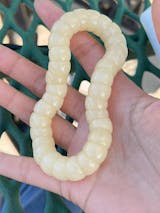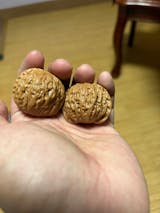Exploring the Beauty and Significance of South Red Agate
Introduction
South Red Agate, historically known as "Chi Yu" , is renowned for its smooth, rich texture and warm, lustrous finish. Often described as “radiant yet not garish, glossy yet not ostentatious,” this gemstone captures the essence of natural beauty and artistry.

A Brief History of South Red Agate
Dating back to the Warring States period, South Red Agate,, also known as Nanhong, was highly favored among the nobility. Numerous archaeological findings, including carved pieces discovered in royal tombs, attest to its popularity. The admiration for this gemstone has persisted through various dynasties, leading to its reputation as the "diamond agate" among collectors due to its vivid colors and smooth texture. Named for its origins in southern China, particularly in regions like Yunnan, southern Sichuan, Qinghai, and Gannan, South Red Agate has been mined and utilized for centuries. Historical texts often refer to it as "Chi Qiong" , emphasizing its esteemed status.

Mineral Characteristices
South Red Agate is a type of chalcedony composed mainly of silicon dioxide. This mineral features a banded structure and comes in a variety of colors, with white being the most common. Due to its limited availability and striking colors, South Red Agate is considered a precious variety within the agate family. Like all natural gemstones, South Red Agate exhibits unique natural characteristics that reflect its origins, akin to how a cheetah’s spots reveal its identity.
Clour Classifications of South Red Agate
The appearance of South Red Agate varies significantly due to geological conditions, resulting in a spectrum of colors. Industry standards commonly classify South Red Agate into the following categories:
-
Brocade Red
Brocade Red is the most sought-after variety, characterized by its vibrant, rich red color. It features a texture that is smooth and glossy, resembling fine satin. Its high quality is evident in the intensity and uniformity of the red hue, making it the top choice among collectors. -
Rose Red
This unique variety leans towards a purplish hue, reminiscent of blooming roses. It can appear semi-transparent with a soft lavender tint when illuminated. Full rose red specimens are rare and typically occur alongside Brocade Red. -
Cherry Red
Cherry Red has a bright, luscious appearance similar to ripe cherries. Predominantly found in Sichuan, these stones are usually semi-translucent and feature high clarity, especially under light. -
Ice Float
Ice Float South Red Agate has a base that is lighter or even colorless, creating a stark contrast with its vibrant red accents. The interplay of these colors gives it a crystalline, ice-like appearance, with the red seeming to "float" atop the clear background. -
Red and White Material
This unique blend features both red and white hues, allowing for innovative designs and artistic expressions when carved. The red typically resembles pure, while the white mimics the look of milk. -
Black and Red Material
This rare variety features a striking combination of black and red, primarily sourced from regions like Yunnan and Jiangsu. The finished products are often sought after for their exceptional aesthetic appeal.
Typical Production Areas
-
Yunnan
Yunnan is renowned for its South Red Agate, particularly from the famous Baoshan region. However, this area often yields smaller pieces due to the stone's tendency to crack. -
Sichuan
Recently discovered South Red Agate mines in Liangshan, Sichuan, have made significant strides in overcoming the cracking issues seen in Baoshan stones, leading to a surge in market interest. -
Gansu
The South Red Agate from Gansu's Diebu region is noted for its bright colors and fewer cloud-like inclusions, establishing it as one of the highest-quality varieties available.
Maintenance of South Red Agate
As a precious gemstone, South Red Agate requires careful maintenance to preserve its beauty. Here are some key tips for taking care of your South Red Agate:
-
Avoid Impact with Hard Objects
Although it has a high hardness level, South Red Agate is also brittle, making it susceptible to breakage upon impact. -
Regular Cleaning
Clean your South Red Agate every 1-3 months. Prolonged exposure to skin oils and dust can dull its surface. Use a soft brush for cleaning; if there are grease stains, wash it gently with mild soapy water and rinse thoroughly. -
Protect from Extreme Temperatures
Keep your South Red Agate away from direct sunlight and extreme temperatures to prevent damage caused by thermal expansion and contraction. -
Frequent Handling
Frequent handling can enhance the luster of South Red Agate. The more you "play" with it, the deeper the color and the glossier the surface will become.
Value and Collectibility
The cultural significance of red in China, symbolizing good fortune and happiness, makes South Red Agate highly sought after. Here are some reasons for its value:
-
Health Benefits
South Red Agate is believed to have various health benefits, according to traditional Chinese medicine. It is said to promote blood circulation, aid respiratory health, and even enhance overall well-being. -
Symbolic Meaning
As one of the seven treasures of Buddhism, South Red Agate is seen as a stone that can communicate with divine entities. Wearing it symbolizes vitality, wealth, and respect, contributing to a positive family atmosphere. -
Scarcity
With its origins rooted in millions of years of volcanic activity and the expert craftsmanship that goes into each piece, South Red Agate is rare. Following the cessation of mining, the gemstone's value is expected to increase significantly in the future, making it a worthy investment for collectors.
Conclusion
South Red Agate holds significant cultural and historical value, along with its stunning natural beauty. As an exquisite gemstone, it is not only cherished for its appearance but also for its deep-rooted connection to heritage and artistry. Whether you are a collector or simply seeking a beautiful piece, South Red Agate is a gem that continues to captivate hearts and minds.
Related articles:
The Meaning and Benefits of Red Agate Jewelry
What is the Difference Between Carnelian and Red Agate?


























































